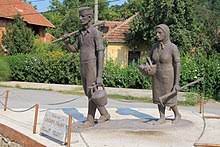Q. Point out the problems in using official sources while writing the history of peasants.
Ans: Using official sources when writing the history of peasants can present several challenges and limitations, as official records often do not provide a comprehensive and accurate representation of the lives and experiences of peasants.

Some problems include:
- Bias and Perspective: Official sources are often produced by those in power, such as government officials or elites, who may have their own biases and perspectives. These sources may overlook or downplay the struggles, concerns, and perspectives of peasants.
- Limited Documentation: Official records may not fully document the everyday lives and activities of peasants, focusing more on administrative matters or events deemed important by the ruling class. As a result, crucial aspects of peasants’ lives may remain undocumented.
- Selective Information: Official sources might selectively highlight aspects that align with the interests of those in power while omitting details that could challenge or contradict the official narrative. This can distort the historical representation of peasants.
- Lack of Peasant Voices: Official sources rarely incorporate direct accounts or voices of peasants themselves. This absence prevents a nuanced understanding of their experiences, beliefs, and challenges.
- Language Barrier: Official records are often written in formal or administrative language that may not accurately capture the local dialects, colloquial expressions, or cultural nuances of peasants.
- Neglect of Subaltern History: Subaltern history focuses on marginalized and oppressed groups, like peasants, who are often excluded from official records. Relying solely on official sources can perpetuate a skewed narrative that ignores these voices.
- Economic and Land Records: While official sources may include economic and land-related records, these might not reflect the complexities of peasant life, such as changing land ownership, tenancy relationships, and socio-economic challenges.
- Resistance and Agency: Peasants often engage in various forms of resistance, protest, and agency against oppressive systems. These acts might not be well-documented in official sources, leading to an incomplete understanding of their resistance history.
- Cultural Practices: Official records might not capture the cultural practices, folklore, rituals, and communal dynamics that shape the lives of peasants and provide insights into their social fabric.
- Lack of Context: Official records might lack the contextual information needed to understand the broader socio-economic, environmental, and political conditions that impact peasants’ lives.
To overcome these limitations, historians must adopt a multi-faceted approach that combines official sources with alternative sources like oral histories, folk narratives, personal diaries, ethnographic studies, and local documents. By triangulating information from various sources, historians can construct a more holistic and accurate representation of the history of peasants and their contributions to society.
Thanks for reading the answer to the question: Point out the problems in using official sources while writing the history of peasants.
Read: